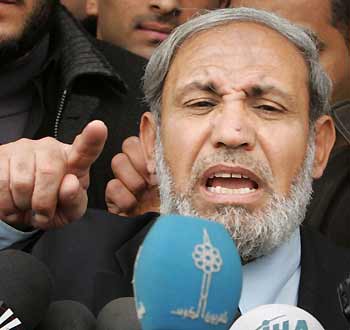|
Officials: Hamas wins Palestinian election
(AP)
Updated: 2006-01-26 20:46
Hamas capitalized on widespread discontent with Fatah's corruption and
ineffectiveness. Much of its campaign focused on internal Palestinian issues,
while playing down the conflict with Israel.

Senior Hamas leader Mahmoud al-Zahar speaks to
journalists after he casts his ballots in Gaza City, January 25,
2006.[Reuters] |
Israeli officials declined comment on the outcome, but senior security
officials gathered Thursday to discuss the results. Acting Prime Minister Ehud
Olmert scheduled talks with senior officials later in the day.
Olmert said Wednesday, before Hamas claimed victory, that Israel cannot trust
a Palestinian leadership in which the Islamic group has a role.
"Israel can't accept a situation in which Hamas, in its present form as a
terror group calling for the destruction of Israel, will be part of the
Palestinian Authority without disarming," Olmert said in a statement issued by
his office.
Reactions to the Hamas victory streamed in from around the world. Italian
Premier Silvio Berlusconi, according to news reports, called it a "very, very,
very bad result." But Benita Ferrero-Waldner, the European Union's external
relations commissioner, said Hamas must be "ready to work for peace" with Israel
if it joins the Palestinian government.
U.N. Secretary-General Kofi Annan congratulated the Palestinian people on the
peaceful elections, which he views as an important step toward a Palestinian
state.
President Bush told The Wall Street Journal on Wednesday the United States
will not deal with Hamas until it renounces its position calling for the
destruction of Israel.
Hamas said before the election it does not want to govern alone, and would
prefer to bring Fatah into a coalition. Hamas officials said the group would
declare its intentions after official results are announced.
Hamas' exiled supreme leader, Khaled Mashaal, called Abbas from Syria to
discuss the results. "He stressed Hamas insists on a partnership with all the
Palestinian factions, especially our brothers in Fatah," Hamas said on its Web
site.
Before the election, Hamas had suggested it would be content as a junior
partner in the government, thus avoiding a decision on its relationship with
Israel. Throughout the campaign, leaders sent mixed signals, hinting they could
be open to some sort of accommodation with Israel. Its apparent victory will now
force it to take a clearer position on key issues, including whether to abandon
its violent ideology.
Mushir al-Masri, a Hamas candidate who won election in the northern Gaza
Strip, sent mixed signals about its plans. He said peace talks and recognition
of Israel are "not on our agenda" but the group is ready for a partnership —
presumably with Abbas.
Fatah's official position wasn't immediately clear. Officials appeared to be
in shock, turning off their phones and avoiding reporters.
|